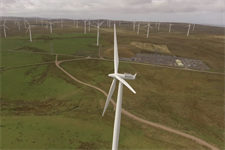Judge rules Scottish wind farm can proceed despite wildcat concerns
Energy Disrupter
.png)
The review was brought by wildcat advocacy group Wildcat Haven through funding raised by supporters, and sought to challenge the Scottish government’s approval of the 77MW Clashindarroch II wind farm currently being developed by Swedish utility Vattenfall in Aberdeenshire.
Wildcat Haven – which is in the process of liquidation, according to UK businesses register Companies House – argued that granting approval for Clashindarroch II could contravene Scotland’s national framework for the development of housing and infrastructure, which provides specific protections for ‘wild land’ areas.
However, the judicial review ruled on 8 February that the wind farm did not contravene existing laws and could go ahead as planned, despite saying that the concerns raised by the campaigners were “reasonable”.
In his ruling, Lord Sandison, who took part in the judicial review, said while it was clear that many interested individuals, as well as the petitioners, had reasonable and serious concerns about the effect of the proposed development on the wildcat population at Clashindarroch, it had not been established that any error of law had been made when granting permission to the development.
“In those circumstances there is no room for intervention by the court,” he added.
Wildcats in Scotland are deemed to be a critically endangered species, and are known to live in the Clashindarroch Forest adjacent to Vattenfall’s existing wind farm.
Vattenfall maintains it has accounted for wildcat protections in its development plans.
A spokesperson for the company said it welcomed the ruling and suggested its existing adjacent 36.9MW Clashindarroch wind farm was proof the new development would not threaten wildcats in the area.
“Vattenfall’s wind farms are designed to both reduce carbon emissions and protect wildlife, and Vattenfall has been working closely with stakeholders such as NatureScot in preparing our environmental plan for Clashindarroch II.
“Our existing wind farm in the forest has already been generating electricity for over eight years with no negative impact on the wildcat population, where we have improved the habitat to provide further cover for the wildcats to hunt and roam,” a spokesperson for the company said.
Wildcat Haven did not rule out pursuing further legal action. “We of course respect the judge’s decision. We are reviewing the decision in detail with our legal team, and will then consider our next steps,” the group said in a statement on its website.
















